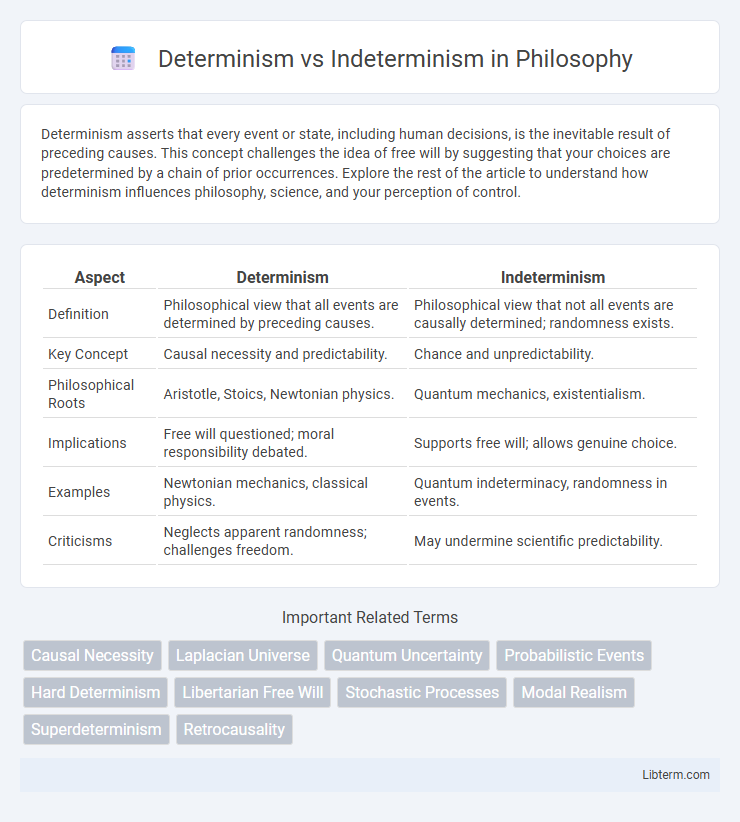Determinism asserts that every event or state, including human decisions, is the inevitable result of preceding causes. This concept challenges the idea of free will by suggesting that your choices are predetermined by a chain of prior occurrences. Explore the rest of the article to understand how determinism influences philosophy, science, and your perception of control.
Table of Comparison
| Aspect | Determinism | Indeterminism |
|---|---|---|
| Definition | Philosophical view that all events are determined by preceding causes. | Philosophical view that not all events are causally determined; randomness exists. |
| Key Concept | Causal necessity and predictability. | Chance and unpredictability. |
| Philosophical Roots | Aristotle, Stoics, Newtonian physics. | Quantum mechanics, existentialism. |
| Implications | Free will questioned; moral responsibility debated. | Supports free will; allows genuine choice. |
| Examples | Newtonian mechanics, classical physics. | Quantum indeterminacy, randomness in events. |
| Criticisms | Neglects apparent randomness; challenges freedom. | May undermine scientific predictability. |
Understanding Determinism: Definition and Key Concepts
Determinism is the philosophical doctrine stating that every event or state of affairs, including human actions, is the necessary outcome of preceding causes, governed by causal laws. Key concepts include causal determinism, which asserts that given initial conditions and natural laws, only one future is possible, and philosophical implications like predestination and the challenge to free will. Understanding determinism involves exploring the relationship between cause and effect, the predictability of events, and the constraints imposed by physical laws on human decision-making.
Indeterminism Explained: Origins and Core Ideas
Indeterminism, rooted in quantum mechanics and philosophical debates, asserts that not all events are causally determined, allowing for randomness and unpredictability in natural processes. Originating from challenges to classical determinism, indeterminism emphasizes the role of chance and free will, particularly in phenomena where outcomes cannot be precisely predicted. Core ideas include the rejection of strict causality, the presence of probabilistic events, and the potential openness of the future, contrasting deterministic frameworks that view the universe as a closed system governed by fixed laws.
Historical Perspectives: From Ancient Philosophy to Modern Science
Ancient philosophers such as Democritus and Stoics embraced determinism, asserting that every event follows a causal chain governed by natural laws. In contrast, Epicureans introduced indeterminism by emphasizing atomic "swerve," introducing chance and randomness into the universe. Modern science, through quantum mechanics and chaos theory, revived indeterministic views, challenging classical deterministic frameworks rooted in Newtonian physics.
Determinism in Physics: Newtonian View to Quantum Theory
Determinism in physics asserts that every event or state is the inevitable result of preceding causes, fundamentally embodied in Newtonian mechanics where precise initial conditions predict exact future states. This classical view faces challenges with the advent of quantum theory, which introduces inherent probabilistic elements and uncertainties, exemplified by Heisenberg's Uncertainty Principle. Despite this, deterministic interpretations like the de Broglie-Bohm theory maintain that quantum processes follow underlying deterministic trajectories, highlighting ongoing debates within foundational physics.
Indeterminism and Quantum Mechanics: Uncertainty as a Principle
Indeterminism in quantum mechanics emphasizes the fundamental role of uncertainty, where the Heisenberg Uncertainty Principle limits precise knowledge of complementary variables like position and momentum. This inherent unpredictability contrasts with deterministic classical physics, suggesting that at a quantum level, outcomes cannot be predetermined with absolute certainty. Quantum indeterminism challenges traditional causal models by introducing probabilistic events as a core aspect of physical reality.
Free Will Debate: Responsibility within Deterministic and Indeterministic Frameworks
The free will debate centers on whether individuals can be held morally responsible given deterministic or indeterministic frameworks. Determinism posits that every event is causally determined by antecedent states, challenging the notion of autonomous choice and raising questions about accountability. Indeterminism introduces randomness or unpredictability, but critics argue that randomness alone does not guarantee responsible agency or coherent moral responsibility.
Causality vs Randomness: Philosophical and Scientific Approaches
Determinism posits that every event is causally determined by preceding states, emphasizing a predictable universe governed by cause-and-effect relationships. Indeterminism, grounded in quantum mechanics and certain interpretations of chaos theory, highlights randomness and probabilistic outcomes that challenge strict causal laws. Philosophical debates explore whether causality necessitates determinism or if genuine randomness can coexist with structured scientific explanations.
Impact on Ethics and Morality: Determined Actions or Random Choices?
Determinism asserts that all actions result from prior causes, implying moral responsibility is based on predictable behavior shaped by those causes. Indeterminism introduces the role of randomness or free will, challenging traditional ethical frameworks by suggesting choices might be uncaused or spontaneous. This debate influences concepts of accountability, justice, and the foundation of ethical decision-making in philosophy and law.
Determinism, Indeterminism, and Artificial Intelligence: Predictability in Machines
Determinism asserts that every event, including human decisions, is the inevitable result of preceding causes, enabling complete predictability under fixed laws of nature. Indeterminism counters this by introducing elements of randomness or unpredictability, suggesting that not all events are pre-determined and some outcomes are inherently uncertain. In artificial intelligence, determinism supports the creation of algorithms and models that predict machine behavior precisely, while indeterminism acknowledges limitations in forecasting AI decisions due to probabilistic learning and autonomous adaptation.
Current Debates and Future Directions in Determinism vs Indeterminism
Current debates in determinism vs indeterminism center on the interpretation of quantum mechanics and the implications for free will, with theorists examining how probabilistic events challenge classical deterministic models. Research in neuroscience and physics explores whether brain processes adhere to deterministic laws or exhibit genuine indeterminacy, influencing philosophical perspectives on moral responsibility. Future directions involve integrating insights from chaos theory, quantum computing, and cognitive science to develop refined models that reconcile determinism with observed randomness in natural phenomena.
Determinism Infographic

 libterm.com
libterm.com